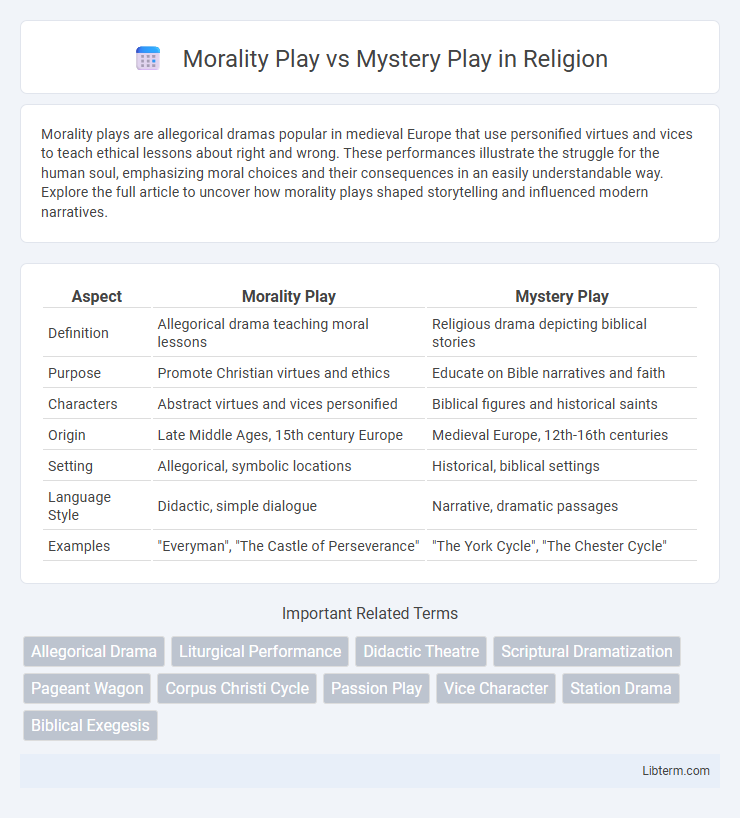Morality plays are allegorical dramas popular in medieval Europe that use personified virtues and vices to teach ethical lessons about right and wrong. These performances illustrate the struggle for the human soul, emphasizing moral choices and their consequences in an easily understandable way. Explore the full article to uncover how morality plays shaped storytelling and influenced modern narratives.
Table of Comparison
| Aspect | Morality Play | Mystery Play |
|---|---|---|
| Definition | Allegorical drama teaching moral lessons | Religious drama depicting biblical stories |
| Purpose | Promote Christian virtues and ethics | Educate on Bible narratives and faith |
| Characters | Abstract virtues and vices personified | Biblical figures and historical saints |
| Origin | Late Middle Ages, 15th century Europe | Medieval Europe, 12th-16th centuries |
| Setting | Allegorical, symbolic locations | Historical, biblical settings |
| Language Style | Didactic, simple dialogue | Narrative, dramatic passages |
| Examples | "Everyman", "The Castle of Perseverance" | "The York Cycle", "The Chester Cycle" |
Introduction to Medieval Drama
Medieval drama encompasses diverse theatrical forms, including morality plays and mystery plays, which both emerged during the Middle Ages. Morality plays personify ethical concepts and virtues to depict the spiritual struggle for salvation, often featuring allegorical characters like Everyman. Mystery plays dramatize biblical stories and religious events, presenting narratives from the Creation to the Last Judgment, performed by guilds to educate and reinforce Christian doctrine.
Defining Morality Plays
Morality plays are a genre of medieval drama that personify moral qualities and human traits to teach ethical lessons, often illustrating the struggle between virtues and vices. Unlike mystery plays, which dramatize biblical stories and events from scripture, morality plays focus on individual salvation and moral choices faced by every person. These allegorical dramas use symbolic characters such as Everyman to convey universal messages about right and wrong conduct.
Understanding Mystery Plays
Mystery plays, originating in medieval Europe, dramatize biblical stories to educate largely illiterate audiences about Christian teachings and scripture. These plays, performed during religious festivals, often depict events from Creation to the Last Judgment, immersing viewers in sacred narratives through vivid storytelling and dramatic enactments. Understanding mystery plays involves recognizing their role in preserving religious tradition and making theology accessible to the general populace through theatrical expression.
Historical Origins and Development
Morality plays originated in the late Middle Ages as allegorical dramas that personified virtues and vices to teach moral lessons, often emerging in the 14th and 15th centuries across England and Europe. Mystery plays, also called miracle plays, developed earlier from religious liturgical dramas dating back to the 10th century, dramatizing biblical stories and saints' lives, predominantly performed by guilds during medieval festivals. Both genres contributed to the evolution of early theatre, with morality plays emphasizing didactic ethical instruction and mystery plays focusing on scriptural narratives and communal religious experience.
Core Themes and Purposes
Morality plays primarily explore the struggle between good and evil within the human soul, emphasizing ethical lessons through allegorical characters representing virtues and vices. Mystery plays focus on dramatizing biblical stories and events, aiming to educate audiences on religious doctrine and scripture. Both types serve as medieval tools for spiritual instruction, but morality plays center on personal morality while mystery plays depict historical salvation narratives.
Key Structural Differences
Morality plays center on allegorical characters representing virtues and vices, designed to teach ethical lessons through personal spiritual journeys, often featuring a protagonist facing moral choices. Mystery plays dramatize specific biblical events or stories from the Bible, structured as episodic scenes performed by guilds, emphasizing communal religious narratives. The key structural difference lies in morality plays' abstract, didactic format versus mystery plays' concrete, narrative enactment of scripture.
Character Types in Each Genre
Morality plays primarily feature allegorical characters embodying abstract virtues and vices, such as Everyman representing humanity and figures like Good Deeds or Knowledge guiding moral lessons. Mystery plays focus on dramatizing biblical events through personified historical and divine characters, including Adam, Noah, and Christ, aiming to teach scriptural stories to medieval audiences. The character types in morality plays are symbolic and didactic, while mystery plays portray literal biblical figures to illustrate religious narratives.
Influence on Audience and Society
Morality Plays, through allegorical characters representing virtues and vices, aimed to influence individual behavior by imparting ethical lessons and promoting personal redemption, thereby shaping societal norms around morality. Mystery Plays, dramatizing biblical stories and communal religious events, fostered collective identity and reinforced shared beliefs within the community, strengthening social cohesion and religious devotion. Both forms deeply impacted medieval audiences by embedding spiritual and moral values into public consciousness, influencing societal attitudes and cultural practices.
Lasting Legacy in Modern Theatre
Morality plays, emphasizing allegorical characters embodying virtues and vices, laid the groundwork for character-driven storytelling in modern theatre. Mystery plays, dramatizing biblical narratives with communal participation, influenced the development of large-scale, historically themed productions and ensemble performance. Both forms contributed to the evolution of theatrical conventions, shaping contemporary drama's engagement with ethical themes and audience involvement.
Morality Play vs Mystery Play: Comparative Analysis
Morality plays and mystery plays represent two distinct forms of medieval drama, with morality plays focusing on allegorical narratives that depict the struggle between good and evil within the human soul, often personified by abstract virtues and vices. Mystery plays, in contrast, dramatize biblical stories and events, serving as didactic tools to educate audiences on scriptural history and religious doctrine. The comparative analysis highlights that morality plays emphasize individual ethical choices and spiritual salvation, whereas mystery plays center on collective religious experience and the reenactment of sacred narratives.
Morality Play Infographic

 libterm.com
libterm.com